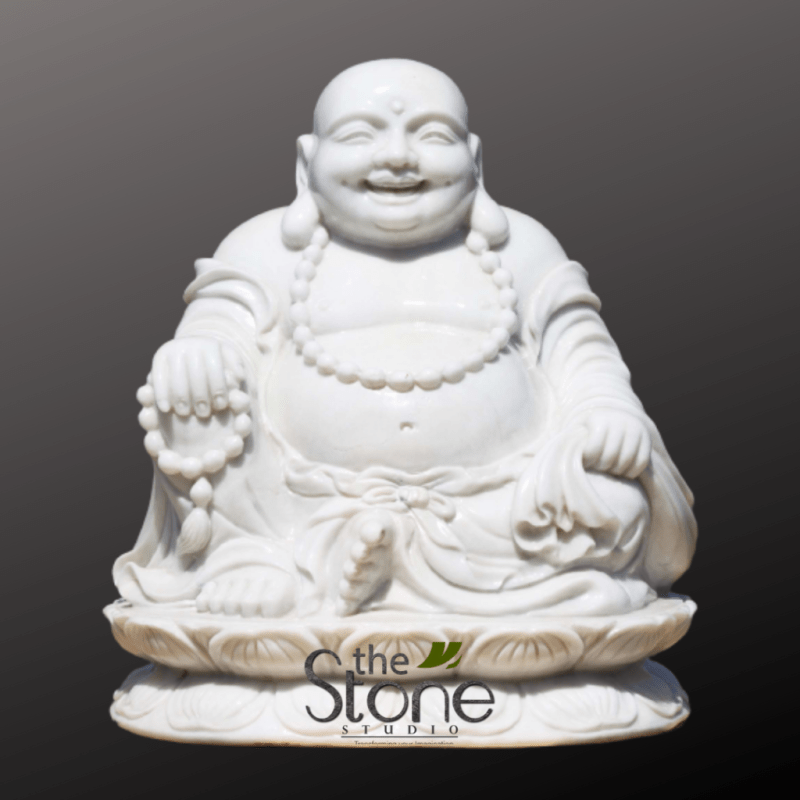Buddha Statue Meaning Luck – It’s difficult not to smile when looking at the happy image and face of a laughing Buddha statue. The cheerful grin, round belly and exuberance of the monk known as Hotei inspire joy and attract good fortune and good fortune when carefully placed. There are many types of laughing Buddha statues, and you may be wondering, what does a laughing Buddha mean? Below you’ll find the meaning and symbolism of each type, as well as some helpful tips on how to incorporate this cheerful figure into your feng shui decor.
The jubilant pot-bellied Laughing Buddha (sometimes called the Happy Buddha or Smiling Buddha) is markedly different from the slender and calm Gautama Buddha, whose teachings form the basis of Buddhism. The Laughing Buddha is believed to be a well-known Chinese monk from the Liang Dynasty (502-557 AD) who was on the path to Buddhahood. In Japanese Buddhism, Hotei is referred to as one of the seven gods of good fortune
Buddha Statue Meaning Luck

Happy Buddha statues bring good luck and joy in feng shui design when placed in your home, office or vehicle, and many people believe that rubbing the round belly of the laughing Buddha brings additional luck.
Ragni Creation Feng Shui Lucky Laughing Buddha, Medium Size Statue (4 Inches), Happy Man For Good Luck, Wealth, Prosperity At Home, Office Decorative Showpiece,happy Man For Office Desk, Table Decor, Home, Shop And
How many types of laughing Buddha statues are there? Laughing Buddha statues come in many poses, which also contain various symbols of special luck and wealth. With all the different meanings and poses of the laughing Buddha statue, you can choose the right statue for any area where you need more happiness. Use the placement chart below to place specific lucky Buddha statues.
The laughing Buddha is often depicted wearing a pearl necklace of wisdom. Some of these statutes also provide that he holds a ball or beads in his hand, the so-called ball of wealth. There are different variations of this symbolic statue. Some depict a standing or seated laughing Buddha holding a ball or bead in each of his raised hands, a reclining pose with bead necklaces around his neck and one in his hand, or many others. Place this statue in places that promote wealth, such as your home office or the career or wealth area of your home.
Sometimes your laughing Buddha statue needs a ride, and having him ride a money frog increases happiness. If you place this good luck Buddha statue correctly, you can increase your professional luck and invite luck, wealth and blessings. Therefore, this symbol is particularly effective when placed in a corporate or home office or in the wealth area of your home.
Money Bags Traveling The Laughing Buddha shows the monk with a large money bag slung over his back and a Wu Lou (gourd), which is a symbol of good health, healing and longevity. The traveling Buddha is a very popular symbol for Feng Shui applications, especially for affected areas that need a little boost of luck. Place it in the health area for good luck and longevity. For family happiness, place it in the family area. For good luck when traveling, place it in the travel area.
Buddha Statue Meanings: 12 Symbolic Poses And Postures
The standing Buddha is nicknamed “Happy” because he laughs and raises his hands above his head as if in celebration. This pose is also called Jolly Hotei. The statue often carries a gold bar or ball held above the head or in each open palm. Jolly Hotei brings wealth and of course luck. Place this statue in the “Wealth” or “Career” section.
A laughing Buddha with children, especially five children, represents a large, healthy and happy family. Feng shui applications use this statue pose to bring luck and blessings into a home and especially happiness to the children in the family. It is also a symbol of creativity and the fullness of a fulfilled and happy life. Place it in the children’s area to attract creativity and happiness for your children.
The laughing Buddha with a fan in hand is often used for auspicious travel and for those wishing to fulfill a wish. The bag is again a symbol of money, or it can symbolize the collection of worries and needs that one wants to carry away from the person. The fan is an ancient symbol known as

This translates to “giving a wish” or “fulfilling a wish,” and this statute is used as a symbol of the fulfillment of wishes. You can place it in any area where you want a wish fulfilled.
Is It Bad Luck To Buy A Buddha Statue For Yourself?
Every laughing Buddha statue can bring good luck. Place a laughing Buddha statue in the following locations to have certain good luck charms:
The materials used to make your smiling Buddha statue can also be placed directly. The materials activate Feng Shui elements and bring positive vibes to different areas of your home.
Some laughing Buddha statues are made of resin or other materials that do not fit the feng shui elements. However, the color they are dyed or painted represents different feng shui elements and can help you determine placement.
Let the constant smile and good mood of the Laughing Buddha increase the energy in your life. Not only will this symbol of good fortune make you grin every time you see him, but placing his statue in your personal spaces can also attract positive energy and promote good feng shui. Some people (mistakenly!) believe that buying a Buddha statue for themselves can bring bad luck. Perhaps the fact that this misconception exists should not be surprising, considering that Buddha statues can bring powerful energies into the home. However, these strong influences of Buddha statues are positive, so there can be no bad luck when buying a Buddha statue. In fact, it is even encouraged.
Close Up Hand Holds Thai Traditional Silver Bowl To Pour Water On The Buddha Statue On Songkran Day To Worship And Make Wishes For The Prosperity. Concept, Cultur Of Faith. Religious Ceremomy
In Buddhism there is a strong association with selflessness and generosity, meaning that the value of gifting a Buddha statue to another often makes headlines. However, there are no teachings that say that the positive aspects of giving a Buddha statue as a gift to another are somehow nullified by purchasing one for yourself.
Note that different Buddha statues can represent different things. So if you’re looking for something specific, it’s worth thinking about what particular style of Buddha statue you want to symbolize and communicate. This can usually be seen by the different body and hand positions of the statue itself. For example, if you are looking for happiness, the laughing Buddha would be a good place to start. The Laughing Buddha (which actually depicts Budai, a Chinese monk, rather than Siddhartha Gautama himself) is a widely recognized symbol in Buddhism and beyond – in fact, you’ve probably seen this type of statue in many places. The statue shows Budai in a sitting position with his head thrown back and laughing. Legend has it that if you bring one of these statues into your home and stroke its belly, it will bring you good luck and prosperity.
There are also many other types of Buddha statues that can do everything from providing confidence and general positivity to providing deep, spiritual guidance in meditation and more rigorous religious practices. However, it is worth noting that if you choose one of these other types of statues, placing them in the house can bring you different types of luck. For example, if you want to encourage good luck at work, you could place your Buddha statue in your home office.

The placement of Buddha statues, as well as how they are generally treated and cleaned, has a big impact on how much happiness they bring into the home. While it is never bad luck to buy a Buddha statue for yourself, it is bad luck to treat your Buddha statue improperly. Don’t worry – there are very simple rules you need to follow to avoid such bad luck. The general manifesto you should follow is to treat your Buddha statue like a distinguished guest. This means do not place it in a bathroom or walkway and do not place it below eye level. There are also basic things like keeping it dust-free and not facing the wall.
Types Of Laughing Buddha Their Importance In Life
Other concerns about the aura of Buddha statues often come from non-Buddhists who wonder whether they too can have a Buddha statue. We have a more detailed article on this here: “Can a non-Buddhist have a Buddha statue”, but the simple answer is that of course a non-Buddhist can have a Buddha statue too. Buddhism is a very open and accessible philosophy and life guide that has been interpreted in many ways over the centuries. His core values of empathy and selflessness resonate with people around the world, and many admire the Four Noble Truths that are at the heart of his teachings.
This adoption of Buddhist teachings is what makes bringing a statue into your home such a joy – quite the opposite. While it’s definitely worth doing your research to know exactly what your statue can do for you (not least so you can make the most of its presence), there’s no such thing as being unlucky when it comes to purchasing it
Sleeping buddha statue meaning, luck buddha, buddha good luck statue, buddha bracelet good luck, buddha statue, buddha statue meaning, shakyamuni buddha statue meaning, buddha statue luck, is a buddha statue good luck, which buddha statue is good luck, cat buddha statue meaning, good luck buddha






